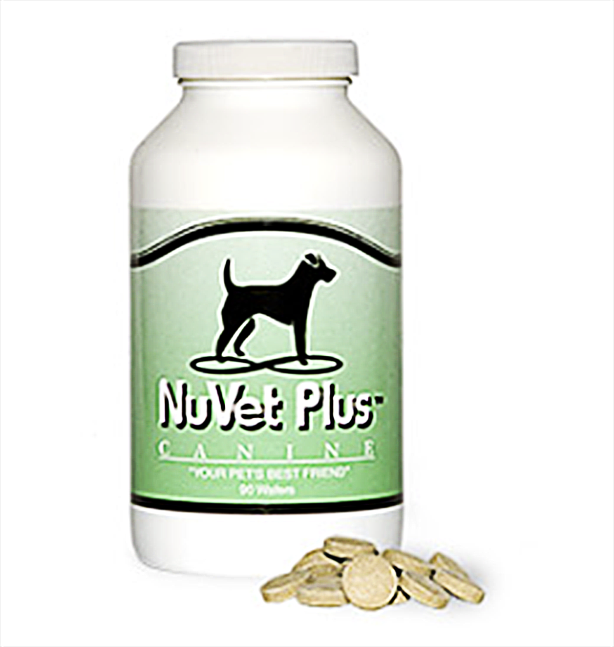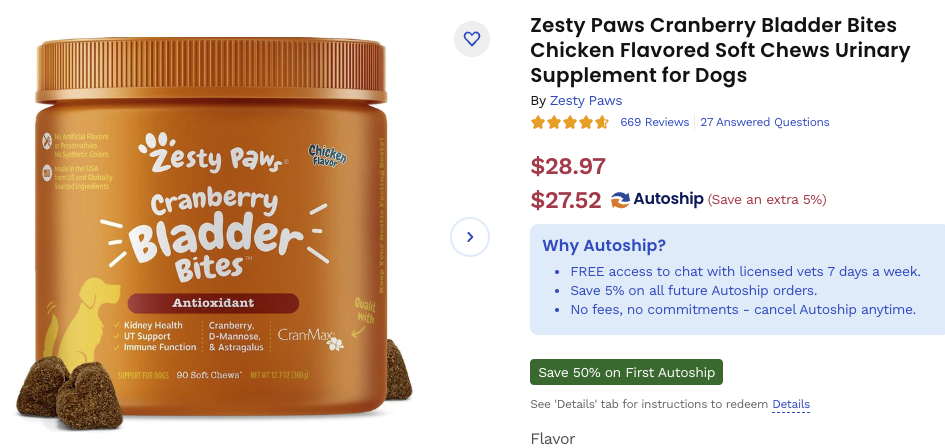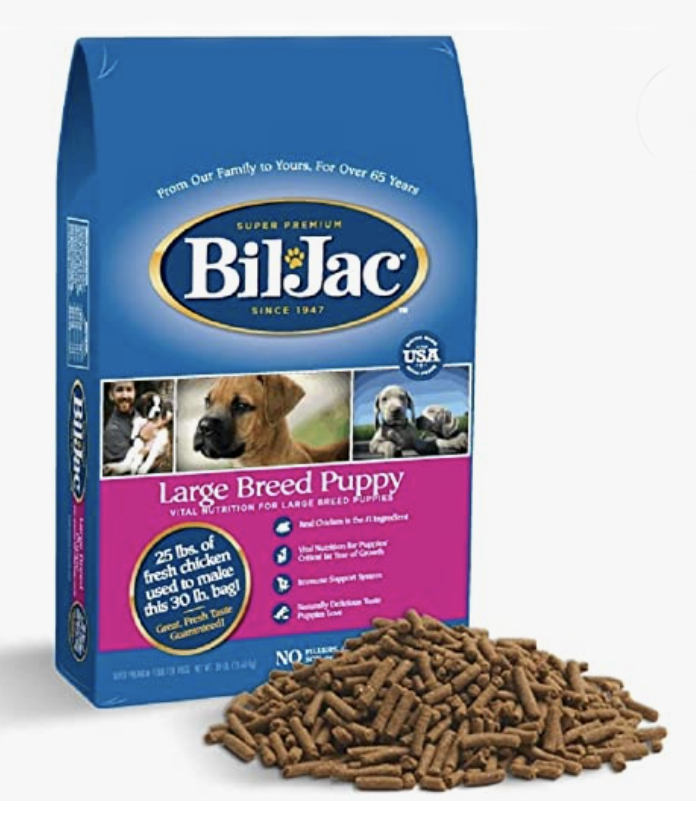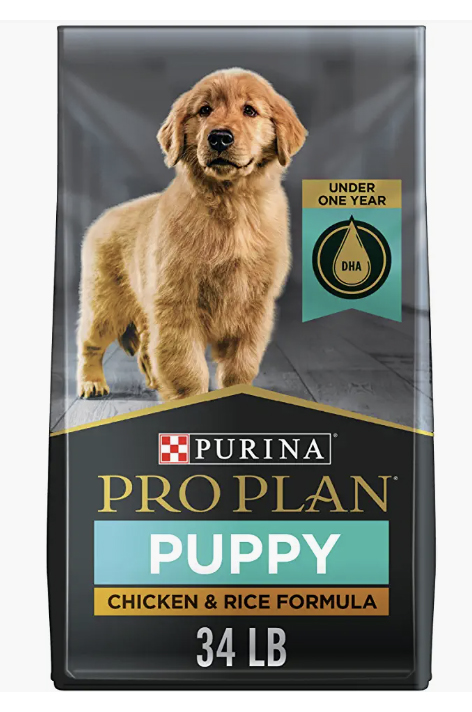
Recommended Food & Dog Treats
What you feed your puppy is very important. We start our puppies out on Bil-Jac when they are first starting to eat food at three weeks old and slowly add in Purina Pro Plan Puppy which we keep them on through their first year.
If you choose to feed your puppy a different food you will need to switch them over gradually to avoid any upset stomach issues.

Vitamins during a puppy’s development are very important, just as they are for babies and children. Immunity boosting is essential for all dogs especially during the early months. There is very little nutritional value in most dog foods on the market as most of them are cooked and heat treated. Most of the micronutrients are destroyed in the process. Your puppy will need proper vitamins and nutrients. For the longest, healthiest life, I strongly recommend NuVet Plus K9 wafers.
NuVet Plus is a high-quality supplement that incorporates a precise formula of antioxidants, amino acids, vitamins, minerals, enzymes, herbs and more. It bolsters their immune system and overall health. NuVet Plus is human grade vitamins and Golden Retrievers are exceptional puppies that deserve and need the best!
In addition to boosting the immune system, NuVet Plus helps promote healthy skin and shiny coat, prevents scratching and itching, and is great for eyes, ears, and digestion. Most importantly it provides nutrients for proper growth and development and helps fortify the bone structure while puppy’s growth plate is still open. I highly recommend having NuVet Plus on hand before you bring your puppy to your home. One bottle is a 90 count and usually last 3-6 months for the puppies while they are growing. Call in for a 15% discount on preferred shipping. Order here athttps://www.nuvet.com/463514 or call 1-800-865-2600 and use code 463514.
Watch the video at this link to learn more on how #NuVetPlus can help your pup. https://www.nuvet.com/index.html
If you are taking home a female pup:
We recommend that you have some of these Bladder Bites on hand as well. Little female pups are prone to urinary track infections. These vitamins have been known to prevent and also cure chronic UTI's even when antibiotics did not help ( testimony from the reviews )

What to avoid feeding your dog
Studies suggest that grain free and a diet high in legumes/potatoes, is potentially causing early Canine Dilated Cardiomyopathy (DCM) in dogs.
According to a recent report released by the FDA and published by the New York Times, there may be a link between certain grain-free dog foods and a specific type of heart disease in dogs. The condition, known as Canine Dilated Cardiomyopathy (DCM), is normally a genetic condition affecting large breed dogs. However, a recent rise in cases in dogs not normally predisposed to the condition has prompted a closer look by the FDA into the matter. Researchers suspect diet may play a key role in the rise, but admit the issue is “complex”. The research is ongoing.
Do Not feed your dog bacon or bacon grease: Bacon grease is loaded with potentially fatal amounts of sodium and low grade fat that can injure your dog even in small amounts, every once in a while. The most common side effect is an upset stomach, but Pancreatitis is also possible. It can damage your dogs health long-term and just a little bit can trigger these life-long conditions.
Foods Toxic to Dogs:
Symptoms that your pet may have eaten harmful foods include lethargy, tremors, seizures, increased body temperature, explosive diarrhea and vomiting, loss of coordination, and even more serious problems, such as kidney and liver failure.
If you think your pet has ingested any of the below items, call your vet or an emergency vet immediately. They will tell you what steps to take and if you need to bring your pet in for emergency care. It’s important to do this right away, because they may be able to induce vomiting instead of having to do a more serious procedure if the food has been digested. (Do not try to induce vomiting on your own.)
Toxic for Pets
1. Alcoholic beverages – One of the most obvious toxic foods for dogs and cats. Can cause vomiting, diarrhea, decreased coordination, central nervous system depression, difficulty breathing, tremors, abnormal blood acidity, coma and even death.
2. Apple seeds – Contain cyanide, so avoid giving pets a whole apple and use slices instead. Anything with cyanide is a cat or dog food to avoid.
3. Apricot stems, leaves and pits – Contain cyanide, which is why pets should never chew on the pits.
4. Avocados – Toxic to horses, cattle, goats and birds; the leaves, fruit, seeds, pit and skin may contain a toxic substance called persin.
5. Caffeine – Contains methylxanthines, which can cause vomiting and diarrhea, panting, excessive thirst and urination, hyperactivity, abnormal heart rhythm, tremors, seizures and even death. A lot of food and drinks you didn’t think had caffeine can contain this stimulant including candies like chocolate, also tea and coffee products.
6. Gum and candy – Any candy containing the toxic artificial sweetener xylitol that can cause insulin release in most species, which can lead to liver failure, should be avoided.
7. Fruit pits – Cherry Stems, leaves, seeds and pits contain cyanide—basically everything but the fruit itself. Be careful to not let cherry pits drop to the floor where your pet could eat them. Peach pits can cause brick red mucous membranes, dilated pupils, difficulty breathing, panting and shock. Be sure not to throw these in the yard where your dog can chew on them.
8. Garlic, onions, onion powder and chives – Contain toxin N-propyl disulfide, which causes vomiting, breakdown of red blood cells (hemolytic anemia, Heinz body anemia), blood in urine, weakness, high heart rate and panting.
9. Grapes and raisins – While its unknown what exactly makes this a dog food to avoid, grapes and raisins have been known to cause kidney failure and are not worth the risk.
10. Hops (used in home beer brewing) – Toxic to dogs; causing panting, high body temperature, seizures and death.
11. Nuts – Oils and fats in almonds, pecans and walnuts can cause vomiting and diarrhea, and potentially pancreatitis. Macadamia nuts can cause weakness, depression, vomiting, tremors and hyperthermia in dogs.
12. Milk and dairy – Can cause diarrhea or other digestive upset in pets, because they do not have enough lactase (the enzyme that breaks down lactose in milk) to process dairy products.
13. Moldy foods – Fungal neurotoxins on old food can cause vomiting, diarrhea, muscle tremors, seizures and elevated body temperature. Symptoms can last 24-48 hours and can cause death if untreated.
14. Mushroom plants – Most mushrooms are safe, but the 1% that are highly toxic can cause life-threatening problems.
15. Mustard seeds – A component of the common condiment mustard can cause severe gastroenteritis, characterized by persistent vomiting and/or diarrhea.
16. Nicotine (found in cigarettes) – Can cause hyperexcitability, then depression, vomiting, in coordination and paralysis; death is possible. Keep ashtrays and cigarette packs (and butts) out of reach of your pets.
17. Potatoes – The leaves and stems (green parts) of the plant can be toxic to animals.
18. Raw/undercooked meat, eggs and bones – While raw and frozen pet foods are great meal options for your dog or cat, raw or undercooked foods meant to be cooked and consumed by humans, like your thawing hamburger meat, can contain bacteria such as Salmonella and E. coli. And, avidin, an enzyme in raw eggs, decreases the absorption of B vitamin biotin, which can lead to skin and coat problems. While meat bones can pose a choking danger.
19. Rhubarb leaves – Can cause kidney failure, tremors and salivation.
20. Salt and salty snacks – Can cause excessive thirst and urination, or even sodium ion poisoning. Symptoms include vomiting, diarrhea, depression, tremors, elevated body temperature, seizures and even death.
21. Tomatoes – The leaves and stems (green parts) can be toxic. Symptoms include hypersalivation, loss of appetite, severe gastrointestinal upset, diarrhea, drowsiness, central nervous system depression, confusion, behavioral changes, weakness, dilated pupils and slow heart rate.
22. Xylitol – *** This is found in sugar free gum- our vet says that it is often fatal when a dog eats gum*** this artificial sweetener is toxic to pets; can cause insulin release in most species, which can lead to liver failure; signs of toxicosis include vomiting, lethargy, loss of coordination and eventually seizures
23. Yeast dough – Can cause a buildup of gas, resulting in bloated stomach, which can potentially twist and become life-threatening. Dogs ingesting raw bread dough can become drunk on the ethanol produced by yeast experiencing a similar reaction as alcoholic beverages .

